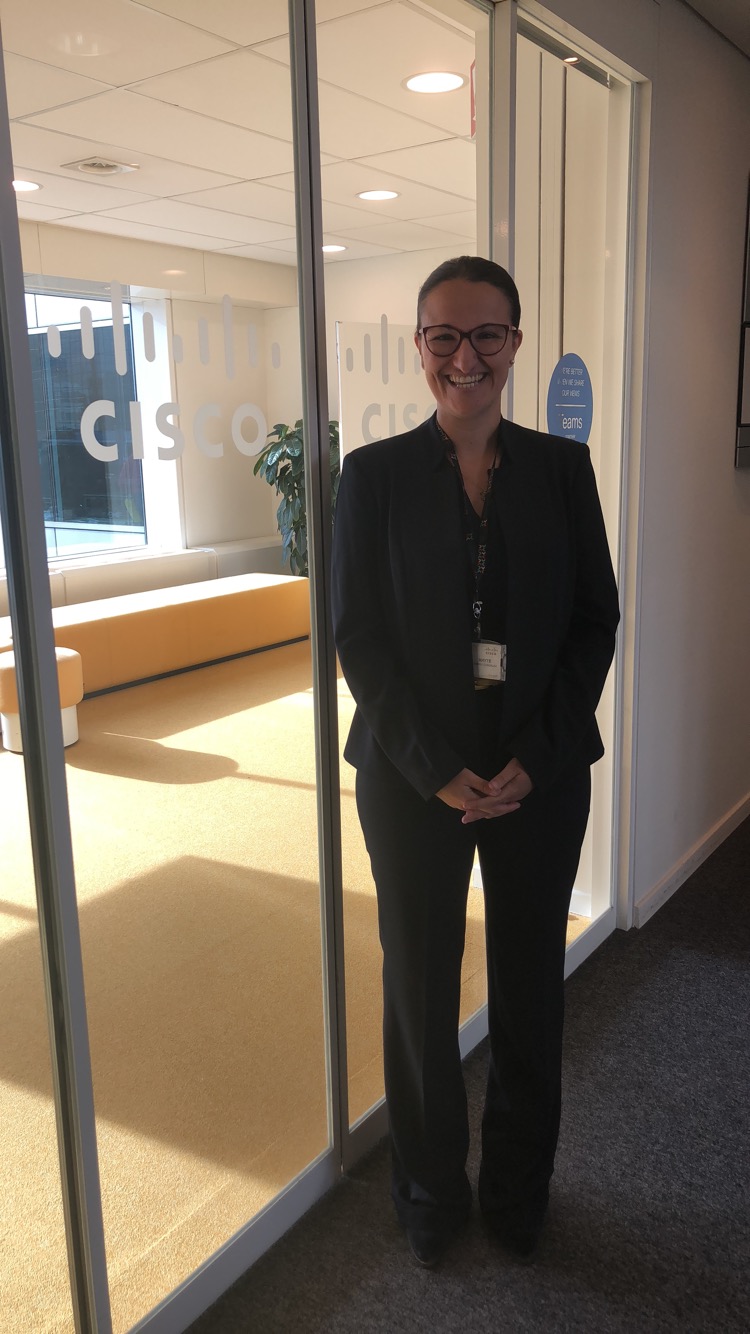- Tell us about where you’re currently working and what your job involves.
I work at Cisco, the world’s leading network company for the Internet and Information Technology (IT). Throughout my career at Cisco, where I recently celebrated my 12th anniversary, I’ve held a number of different roles, from Support Engineer at the Technical Support Centre, to Manager of a team of engineers, business development and the portfolio of offerings for our customers and project manager. The moment in my career that I most remember is when I was in charge of designing and implementing the technical support model for the London Olympics in 2012. Knowing that my work would allow millions of spectators around the world to follow and enjoy the Olympics was so rewarding, it was a great experience in which I learned a lot.
Today, I focus on leading our clients’ experience in Digitalisation Projects in Spain, Portugal, Italy and Israel, where we are creating the Smart Cities of the future, among other very interesting projects.
- What motivated you to study an engineering degree?
I have to admit that I didn’t arrive at Engineering by vocation, but rather by chance. When I was 17 years old, a motorcycle accident changed my life, and my plan to dedicate myself to the world of sport were cut short. It was at that point that I had to reinvent myself and seek out a career that would allow me to do what I liked best: find solutions and satisfy my curiosity about how things work, so I took the decision to study engineering. When I started my studies in Telecommunications Engineering, I entered an unknown world that was nothing like I imagined, but the more I discovered, the more I liked it, so I decided to continue my studies and graduate in Higher Engineering [a 5-year programme equivalent to a Master’s].

Mayte Cubino at Cisco offices
- There’s a shortage of young women interested in STEM topics such as engineering. Why do you think this is?
From my point of view, stereotypes have been created in recent decades that have greatly damaged STEM careers. Science, engineering and technology are associated with a social stigma where those who decide to study these subjects are subject to stereotypes of being unpopular, nerdy, wearing large glasses and carrying pens in their shirts. This is the image that’s sold to us in TV series and films, and it’s greatly damaged the image that young women have of these careers and future (social) prospects if they decide to pursue them.
Who hasn't seen series like "The Big Bang Theory"? It's just one example of how women in the field of STEM are characterised. It’s not hard to see how, at early ages when interest in these subjects is developed, the examples of advertising and stereotypes we see on television today can influence and have an effect on girls and young women.
- What do you think could be done to increase their interest?
We have to counter those stereotypes, with examples that show that television fiction is just that, fiction, and that it has nothing to do with reality. We need to promote the wonderful work carried out by so many women in STEM subject areas, who are changing the world without losing one jot of their femininity or losing their essence and charisma. More TV series and films to reflect this reality would also be helpful.
We need to expose young women to what STEM really means so they can see it with their own eyes and experience with their own hands just how fun, interesting and inspiring science, technology, engineering and mathematics can be, and how they are present in so many things they would never even think (fashion, nature, the environment).
- And at universities?
I think universities play a fundamental role in inspiring young women, connecting them with students, whether they are currently studying or already graduates, who can help them adapt and make sense of the unknown environment that a university can represent at first, answer their questions about the role of women in those careers and in the workplace, and become role models. They can be clear and living proof that it is possible and worthwhile.
Events such as Greenlight for Girls is an example of the important role a university like La Salle Campus Barcelona can play in inspiring girls and young women to study STEM careers, bringing them a small taster of university to them, so that they can experience it, enjoy it and get excited about all the things they can achieve. There's nothing like creating that window into the future through which they can see the immense world of opportunities that STEM careers present to them.
- What do you think of the role of women in the sector?
Women play a fundamental role, and this has been proven by many studies, which show that those companies with most women are much more productive and have better benefits in all senses, not just financially. Much progress has been made in recent years, and we’re seeing the fruits of several initiatives focused on increasing the presence of women in the sector and in managerial positions in companies. There’s still a long way to go, but the commitment to make progress and increase the presence of women in the sector is a reality, and I trust we’ll see results very soon.
- And what will be the trend in the coming years?
Digitalisation has transcended the business sphere and is now affecting all areas of our lives. The secret to making this digitalisation a success is to be able to create environments of innovation to shape it. A recent study highlighted how companies with more women in management positions are more innovative, so their role is now more crucial than ever.
There’s still a long way to go, but looking at this data, there’s no doubt that the opportunities ahead are immense, and it's definitely true that there is a will and the mentality there to see much more women getting involved in the sector than they are today, bringing with them so many benefits and success stories.
